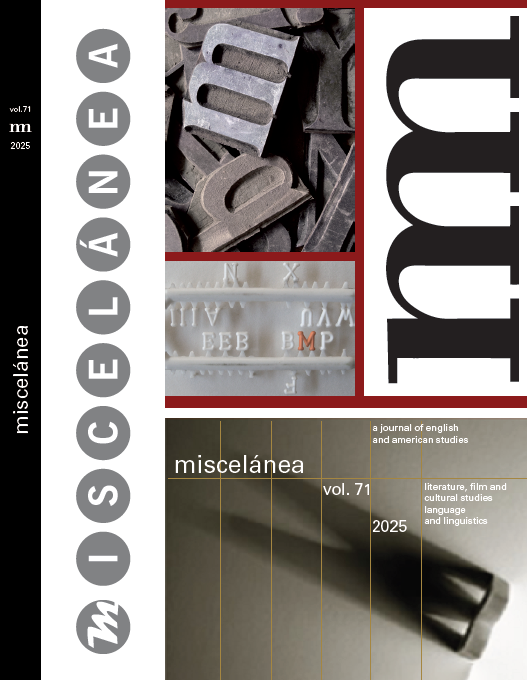Hacia la cubanidad a través de la santería: Influencia de la nostalgia como instrumento mercantilizado en la protagonista de la novela Soñar en Cubano (1992)
DOI:
https://doi.org/10.26754/ojs_misc/mj.202510510Palabras clave:
cubano-americano, nostalgia, santería, ficciónResumen
Maya Socolovsky afirma que “la nación cubana en las novelas de García es un asunto altamente individualizado y personal” (Socolovsky 2013: 133, traducción mía).[i] Este estudio, sirviéndose de la descripción de nostalgia como método para “desarrollar, sostener y recrear la identidad de las personas” (Sierra y McQuitty 2007: 100, traducción mía),[ii] entiende la santería como una práctica nostálgica, capaz de habilitar el reclamo de la identidad nacional (cubanidad). En este artículo se analiza un extracto de la novela de Cristina García, Soñar en Cubano (1992), centrándose en el uso de esta práctica como vehículo para que la protagonista, Pilar, genere una conexión tangible con su identidad y tradiciones cubanas, incluso a pesar del desarraigo físico que siente hacia su tierra natal. Finalmente, se pretende demostrar que, a través del poder transformador de los rituales y creencias de esta religión sincrética, Pilar reconecta con su identidad nacional y étnica, y, asimismo, con sus sentimientos de arraigo, que había intentado ignorar durante todos sus años como inmigrante latina en los Estados Unidos.
[i]. “the Cuban nation in García’s novels is a highly individualized and personal matter”.
[ii]. “develop, sustain, and recreate individuals’ identities”.
Descargas
Referencias
ALVAREZ, Carlos, Linda A. BLISS y Peter VIGIL. 2001. “Cuban Identity: A Preliminary Study”. Annual Meeting of the American Educational Research Association, Seattle, WA, 10-14 abril. https://files.eric.ed.gov/fulltext/ED454316.pdf
ARGYRIADIS, Kali. 2005. “Religión de indígenas, religión de científicos: construcción de la cubanidad y santería”. Desacatos 17: 85-106.
BAKER, Elizabeth Ann. 2016. “To Be Magic: The Art of Ana Mendieta Through an Ecofeminist Lens”. Trabajo Fin de Grado. University of Central Florida.
BOYM, Svetlana. 2001. The Future of Nostalgia. Basic Books.
CABAÑAS, Kaira M. 1999. “Ana Mendieta: ‘Pain of Cuba, Body I Am’”. Woman’s Art Journal 20 (1): 12-17. DOI: https://doi.org/10.2307/1358840
CASTELLANOS, Jorge e Isabel CASTELLANOS. 1992. Las religiones y las lenguas. Ediciones Universal.
COLÓN, Cristóbal. (1492) 1959. Diarios de Colón: Primer Viaje. Edición de Luis Arranz Márquez. Imprenta Nacional.
FERRER, Ada. 2021. Cuba: An American History. Scribner.
FILLER, Andrew. 2019. Through a Glass, Darkly: Collective Memory in the Works of Cristina García and Ana Menéndez. Tesis de Máster. University of Georgia.
GARCÍA, Cristina. 1992. Dreaming in Cuban. Ballantine Books.
GARCÍA, Cristina. 1994. Soñar en Cubano. Traducido por Marisol Palés Castro. Ballantine Books.
GARCÍA-FERRAZ, Nereyda, Kate HORSFIELD y Branda MILLER. 1987. Ana Mendieta: Fuego de Tierra. Women Make Movies.
GROSS, Rachel B. 2021. Beyond the Synagogue: Jewish Nostalgia as Religious Practice. New York U.P. DOI: https://doi.org/10.18574/nyu/9781479803408.001.0001
HALTER, Marilyn. 2000. Shopping for Identity: The Marketing of Ethnicity. Schocken.
HERTER, Philip. 1992. “Voices of Cuba”. Tampa Bay Times.
HIRSCH, Marianne. 1999. “Projected Memory: Holocaust Photographs in Personal and Public Fantasy”. En Bal, Mieke, Jonathan Crewe y Leo Spitzer (eds.) Acts of Memory: Cultural Recall in the Present. University Press of New England: 3-23.
HOOKS, Bell 2014: Black Looks: Race and Representation. Routledge. DOI: https://doi.org/10.4324/9781315743226
Joe Rogan Experience Clips. 2018. “Joe Rogan - Joey Diaz Explains Santeria”. YouTube (27 marzo). https://www.youtube.com/watch?v=s_PdXJoPEKM&t=90s
KAMINSKY, Amy K. 1993. Reading the Body Politic: Feminist Criticism and Latin American Women Writers. University of Minnesota Press.
KANDIYOTI, Dalia. 2006. “Consuming Nostalgia: Nostalgia and the Marketplace in Cristina García and Ana Menéndez”. MELUS 31 (1): 81-97. DOI: https://doi.org/10.1093/melus/31.1.81
LEFEVER, Harry G. 1996. “When the Saints Go Riding In: Santeria in Cuba and the United States”. Journal for the Scientific Study of Religion 35 (3): 318-330. DOI: https://doi.org/10.2307/1386562
LÓPEZ, Alfred. 1996. “Of Home and Remembrance: Two Recent Works of Cuban-American Literature”. The Iowa Review 26 (1): 202-206. DOI: https://doi.org/10.17077/0021-065X.4565
MÉNDEZ, Susan C. 2011. “Like a Dialect Freaked by Thunder: Spiritual Articulations of Survival and Identity in Cristina García’s Dreaming in Cuban and Monkey Hunting”. Chicana/Latina Studies 11 (1): 124-157.
OBEJAS, Achy. 2007. Days of Awe: A Novel. Ballantine Books.
ORTIZ, Fernando. 1940. “Los factores humanos de la cubanidad”. Revista Bimestre Cubana 21: 161-186.
RAY, Nina M. y Gary MCCAIN. 2012. “Personal Identity and Nostalgia for the Distant Land of Past: Legacy Tourism”. International Business & Economics Research Journal 11 (9): 977-990. DOI: https://doi.org/10.19030/iber.v11i9.7181
RICH, Adrienne. 1976. Of Woman Born: Motherhood as Experience and Institution. Norton.
RICHARDSON, Jill Tolliver. 2018. The Afro-Latin Experience in Contemporary American Literature and Culture: Engaging Blackness. Palgrave Macmillan.
SÁEZ, Elena Machado. 2005 “The Global Baggage of Nostalgia in Cristina García’s Dreaming in Cuban”. MELUS 30 (4): 129-147. DOI: https://doi.org/10.1093/melus/30.4.129
SARDUY, Severo. 1986. “Otro Daiquirí”. Vuelta 117: 13-14.
SIERRA, Jeremy J. y S. MCQUITTY. 2007. “Attitudes and Emotions as Determinants of Nostalgia Purchases: An Application of Social Identity Theory”. Journal of Marketing Theory and Practice 15 (2): 99-112. DOI: https://doi.org/10.2753/MTP1069-6679150201
SOCOLOVSKY, Maya. 2013. Troubling Nationhood in US Latina Literature: Explorations of Place and Belonging. Rutgers U.P.
STEFANKO, Jacqueline. 1996. “New Ways of Telling: Latinas’ Narratives of Exile and Return”. Frontiers: A Journal of Women Studies 17 (2): 50-69. DOI: https://doi.org/10.2307/3346592
SU, John J. 2005. Ethics and Nostalgia in the Contemporary Novel. Cambridge U.P. DOI: https://doi.org/10.1017/CBO9780511485398
Descargas
Publicado
Número
Sección
Licencia
Derechos de autor 2025 Carlos David Vázquez Pérez

Esta obra está bajo una licencia internacional Creative Commons Atribución-NoComercial 4.0.


